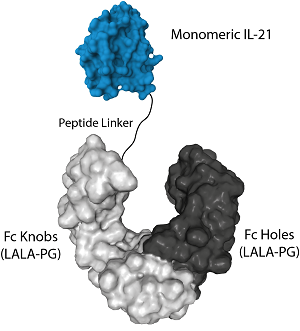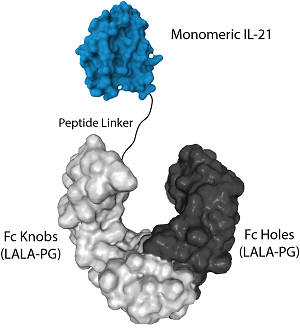IL-21 (mouse):Fc (mouse) (rec.) (non-lytic)
CHI-MF-12021
Product group Proteins / Signaling Molecules
Overview
- SupplierChimerigen Laboratories
- Product NameIL-21 (mouse):Fc (mouse) (rec.) (non-lytic)
- Delivery Days Customer2
- CertificationResearch Use Only
- Estimated Purity>98%
- Scientific DescriptionInterleukin-21 (IL-21) is a key factor in the transition between innate and adaptive immune responses secreted by activated T cells. The IL-21 receptor (IL-21R) is expressed in lymphoid tissue, in particular by NK, B, T and dendritic cells, macrophages and endothelial cells. Recent evidence suggests that IL-21 plays a supportive role in the proliferation of T and B cells and influences the cytolytic activity of natural killer cells. IL-21 has been shown to up-regulate genes associated with innate immunity and to inhibit the differentiation of naive T helper cells. IL-21 specifically inhibits IFN-gamma production from developing TH1 cells and is preferentially expressed by TH2 cells. Furthermore IL-21 has been identified as a growth and survival factor for human myeloma cells. IL-21/IL-21R interactions have a unique role in sequentially activating both innate and adaptive immune responses against poorly immunogenic tumors, leading to tumor rejection that is perforin dependent but IFN-gamma independent. - Protein. The extracellular domain of mouse IL-21 (aa 18-146) is fused to the N-terminus of the Fc region of a mutant mouse IgG2a. Source: CHO cells. Endotoxin content: 98% (SDS-PAGE). Interleukin-21 (IL-21) is a key factor in the transition between innate and adaptive immune responses secreted by activated T cells. The IL-21 receptor (IL-21R) is expressed in lymphoid tissue, in particular by NK, B, T and dendritic cells, macrophages and endothelial cells. Recent evidence suggests that IL-21 plays a supportive role in the proliferation of T and B cells and influences the cytolytic activity of natural killer cells. IL-21 has been shown to up-regulate genes associated with innate immunity and to inhibit the differentiation of naive T helper cells. IL-21 specifically inhibits IFN-gamma production from developing TH1 cells and is preferentially expressed by TH2 cells. Furthermore IL-21 has been identified as a growth and survival factor for human myeloma cells. IL-21/IL-21R interactions have a unique role in sequentially activating both innate and adaptive immune responses against poorly immunogenic tumors, leading to tumor rejection that is perforin dependent but IFN-gamma independent.
- Storage Instruction-20°C,2°C to 8°C
- UNSPSC41116120
- SpeciesMouse


